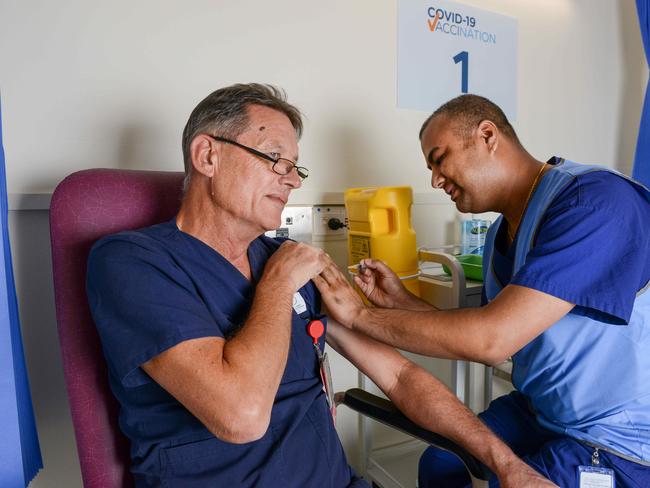Four-step vaccine testing holding up Australia’s rollout
This is the key roadblock in Australia’s vaccine rollout and when the Pfizer and AstraZeneca jabs start to protect you after getting the jab.
Coronavirus
Don't miss out on the headlines from Coronavirus. Followed categories will be added to My News.
Exclusive: Quality testing of CSL’s COVID-19 vaccine has emerged as a key roadblock in the vaccine rollout which is millions of doses behind schedule.
It takes four weeks for every batch of CSL’s COVID-19 vaccine to undergo quality testing before it can be released to vaccine providers.
News Corp can reveal there is a four step quality control process that sees CSL, AstraZeneca and the Therapeutic Goods Administration test a sample of each batch to make sure it is potent enough to prevent infection and clear of any contaminants.
Separately AstraZeneca has to send records of the how the vaccine is made, tested, shipped and stored to its overseas headquarters for sign off.
Prime Minister Scott Morrison said the testing was “not a hold up” but necessary to ensure the vaccine was safe.
The government had promised there would be one million doses of CSL vaccine supplied every week from the end of March but this is not happening.
Neither Mr Morrison nor CSL will reveal how many doses are currently being supplied and CSL said it “hopes to reach a rolling output of one million doses a week as soon as possible”.
“Now, as CSL are ramping up their production and their systems are becoming even more efficient as they get into the rhythm of their production systems, there is also the approvals that they must follow once batches are produced,” he said.
“That involves both AstraZeneca internationally, it involves the TGA batch testing as well.
“It is not just a matter of having the vaccine approved initially by the TGA, they have to test the batches as well.
“That is about Australia’s safety, and I don’t intend to rush the process and put people’s health at risk.”

News Corp has learned there were 2.5 million doses available on March 24 although some required labelling.
Just 830,000 of those doses were tested and released by the Therapeutic Goods Administration on March 24.
News Corp understands another batch of an undisclosed number of vaccines (possibly 500,000) was released last week.
With around one million Australians now vaccinated it doesn’t mean they can relax and stop social distancing.
Our two main vaccine options — Pfizer and AstraZeneca — do not provide instant protection and take at least two weeks to properly gel with a person’s immune system.
The good news is just a single dose of either COVID-19 vaccine is likely to be enough to keep people out of hospital — even if they still catch the virus causing the pandemic.
Partial protection against COVID-19 starts 12 days after the first dose, the Department of Health advises.
A US Centre for Disease Control study found two weeks after a single dose of the Pfizer jab your risk of infection was reduced by 80 per cent.
A separate study by Public Health England showed four weeks after a single dose the Pfizer vaccine reduced the risk of hospital admissions from COVID-19 by up to 85 per cent.
A single dose of the AstraZeneca vaccine was even more effective – 94 per cent — at reducing hospitalisations four weeks after it was administered, the Public Health England study found.
Two doses of the vaccines will give you even more protection and the Department of Health has said this happens seven days after the second dose of the Pfizer vaccine and two weeks after the second dose of the AstraZeneca vaccine.
With hundreds of thousands of Australians now immunised more than 1500 side effects have been reported to COVID-19 vaccines.
The Therapeutic Goods Administration estimates 5.4 people in every 1000 who receive the vaccination will experience a side effect.
The vast bulk of these side effects were not serious and included headache, sore arm, diarrhoea and fever.
However, there were 13 cases of anaphylaxis associated with the Pfizer vaccine, five reports of facial weakness, two seizures, two strokes and one case of deep vein thrombosis.
“Seizures are being monitored because of a theoretical link with vaccines, while stroke and deep vein thrombosis is being monitored because of a theoretical link with COVID-19 disease,” said the medicines regulator, the Therapeutic Goods Administration (TGA).
A single case of rare blood clots has been associated with the AstraZeneca vaccine in Australia as well as a number of cases overseas.
The TGA has said it has established “no cause-and-effect relationship between COVID-19 vaccination and this case (or those reported internationally)”.
“The TGA’s assessment is that the benefits of vaccination against COVID-19 continue to outweigh any risks,” it advises.
More Coverage
Originally published as Four-step vaccine testing holding up Australia’s rollout





